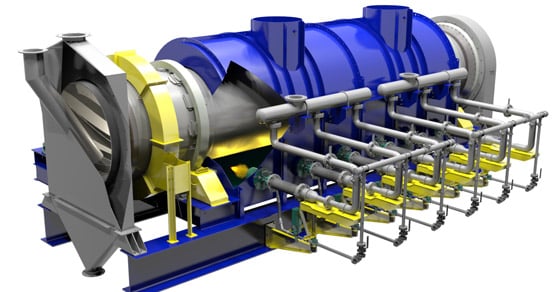Soda ash, or sodium carbonate (Na2CO3), is a versatile alkali material, critical in the production of a litany of products and materials. From detergents and chemicals, to consumer products and water softeners, this material can be found in many of the products we interact with throughout our daily lives. Most notably, it is a key ingredient in the production of glass; about 50% of soda ash production is slated for the glass industry.
Central to the production of natural soda ash is one thermal processing device: the rotary calciner.
Soda Ash Production
Historically, soda ash was manufactured via the Solvay process, a series of chemical reactions utilizing sodium chloride, ammonia, and limestone for production.
In the first half of the twentieth century, however, the largest deposit of trona ore was discovered in the Green River Basin of Wyoming. Naturally occurring trona ore can be mined and refined into soda ash for less cost than the manufacture of it via the Solvay process. As such, this method of production has largely replaced the Solvay method in North America.
Natural soda ash production from trona ore is also a more environmentally friendly process; in China, where it is primarily produced synthetically, production results in 2-3 times more CO2 emissions and consumes 2-3 times more energy than natural soda ash production.
The US is able to be completely self-reliant in supplying all of our demand for soda ash, as well as exporting some; the Green River Basin deposit of trona ore supplies around 90% of the US’s soda ash demand alone, making this a hotbed for production. According to the Wyoming Mining Association, in 2015, Wyoming mines produced in excess of 17 million tons of trona.
Processing Trona Ore into Soda Ash
The process of transforming trona ore into soda ash is relatively simple. And while various processing methods exist for processing trona ore into soda ash, two primary methods of a similar nature prevail, with a calciner at the heart of each:
The Sesquicarbonate Method
In this method, trona ore is first dissolved in an aqueous solution. The solution is separated from the insolubles, where it moves on to crystallizing via cooling. The crystals are separated from the liquor and processed in a calciner to recover the soda ash.
The Monohydrate Method
The monohydrate process begins with calcination of the trona ore, which converts the bicarbonate component to sodium carbonate. This is then dissolved in water and separated from the insolubles. The sodium carbonate monohydrate material is then precipitated to evaporative crystallization and the monohydrate crystals separated out and dried in order to recover soda ash.
The Role of the Rotary Calciner in Soda Ash Production
The two aforementioned processes rely on the rotary calciner to produce the purified soda ash.
The rotary calciner is comprised of a large, rotating cylinder (aka the drum), through which process gas is passed, allowing it to directly contact the material to cause the intended reaction. The term calciner technically refers to an indirect-fired unit, where the drum is externally heated to avoid direct contact between the material and process gas, but in the soda ash industry, the term is generally applied to the direct-fired units utilized in this setting.
Further complicating the matter, technically speaking, the calciner or “kiln” used in soda ash production is merely a low temperature rotary dryer.
No matter what they are called, the calciner plays a critical part in the soda ash production process. The calciner is used to heat the trona ore to around 300 – 350º F. Heating to this temperature drives off CO2 and some water to yield soda ash that can be further processed into a more pure form.
Once trona ore has been processed, the now pure form of soda ash can be utilized in any number of processes to produce the products we rely on every day.
Conclusion
Soda ash is a diverse material, widely used across a number of industries to produce various products and materials essential in our daily lives. Calciners are a key tool in the production of natural soda ash from trona ore.
FEECO offers custom rotary calciners for the production of soda ash, as well as feasibility testing, and complete material handling systems. For more information, contact us today!

